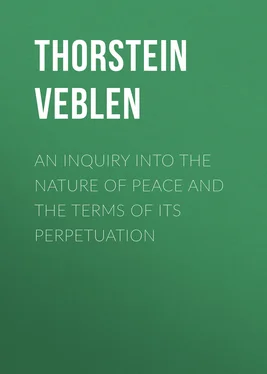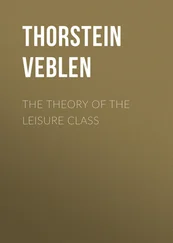Thorstein Veblen - An Inquiry into the Nature of Peace and the Terms of Its Perpetuation
Здесь есть возможность читать онлайн «Thorstein Veblen - An Inquiry into the Nature of Peace and the Terms of Its Perpetuation» — ознакомительный отрывок электронной книги совершенно бесплатно, а после прочтения отрывка купить полную версию. В некоторых случаях можно слушать аудио, скачать через торрент в формате fb2 и присутствует краткое содержание. Жанр: foreign_antique, Политика, Юриспруденция, foreign_edu, на английском языке. Описание произведения, (предисловие) а так же отзывы посетителей доступны на портале библиотеки ЛибКат.
- Название:An Inquiry into the Nature of Peace and the Terms of Its Perpetuation
- Автор:
- Жанр:
- Год:неизвестен
- ISBN:нет данных
- Рейтинг книги:5 / 5. Голосов: 1
-
Избранное:Добавить в избранное
- Отзывы:
-
Ваша оценка:
- 100
- 1
- 2
- 3
- 4
- 5
An Inquiry into the Nature of Peace and the Terms of Its Perpetuation: краткое содержание, описание и аннотация
Предлагаем к чтению аннотацию, описание, краткое содержание или предисловие (зависит от того, что написал сам автор книги «An Inquiry into the Nature of Peace and the Terms of Its Perpetuation»). Если вы не нашли необходимую информацию о книге — напишите в комментариях, мы постараемся отыскать её.
An Inquiry into the Nature of Peace and the Terms of Its Perpetuation — читать онлайн ознакомительный отрывок
Ниже представлен текст книги, разбитый по страницам. Система сохранения места последней прочитанной страницы, позволяет с удобством читать онлайн бесплатно книгу «An Inquiry into the Nature of Peace and the Terms of Its Perpetuation», без необходимости каждый раз заново искать на чём Вы остановились. Поставьте закладку, и сможете в любой момент перейти на страницу, на которой закончили чтение.
Интервал:
Закладка:
All this, of course, is intended to apply only so far as it goes. It must not be taken as intending to say any least word in derogation of those high qualities that inspire the patriotic citizen. In its economic, biological and cultural incidence patriotism appears to be an untoward trait of human nature; which has, of course, nothing to say as to its moral excellence, its aesthetic value, or its indispensability to a worthy life. No doubt, it is in all these respects deserving of all the esteem and encomiums that fall to its share. Indeed, its well-known moral and aesthetic value, as well as the reprobation that is visited on any shortcomings in this respect, signify, for the purposes of the present argument, nothing more than that the patriotic animus meets the unqualified approval of men because they are, all and several, infected with it. It is evidence of the ubiquitous, intimate and ineradicable presence of this quality in human nature; all the more since it continues untiringly to be held in the highest esteem in spite of the fact that a modicum of reflection should make its disserviceability plain to the meanest understanding. No higher praise of moral excellence, and no profounder test of loyalty, can be asked than this current unreserved commendation of a virtue that makes invariably for damage and discomfort. The virtuous impulse must be deep-seated and indefeasible that drives men incontinently to do good that evil may come of it. "Though He slay me, yet will I trust in Him."
In the light—and it is a dim and wavering light—of the archaeological evidence, helped out by circumstantial evidence from such parallel or analogous instances as are afforded by existing communities on a comparable level of culture, one may venture more or less confidently on a reconstruction of the manner of life among the early Europeans, of early neolithic times and later. 5 5 Cf. Imperial Germany and the Industrial Revolution , as above.
And so one may form some conception of the part played by this patriotic animus among those beginnings, when, if not the race, at least its institutions were young; and when the native temperament of these peoples was tried out and found fit to survive through the age-long and slow-moving eras of stone and bronze. In this connection, it appears safe to assume that since early neolithic times no sensible change has taken effect in the racial complexion of the European peoples; and therefore no sensible change in their spiritual and mental make-up. So that in respect of the spiritual elements that go to make up this patriotic animus the Europeans of today will be substantially identical with the Europeans of that early time. The like is true as regards those other traits of temperament that come in question here, as being included among the stable characteristics that still condition the life of these peoples under the altered circumstances of the modern age.
The difference between prehistoric Europe and the present state of these peoples resolves itself on analysis into a difference in the state of the industrial arts, together with such institutional changes as have come on in the course of working out this advance in the industrial arts. The habits and the exigencies of life among these peoples have greatly changed; whereas in temperament and capacities the peoples that now live by and under the rule of this altered state of the industrial arts are the same as they were. It is to be noted, therefore, that the fact of their having successfully come through the long ages of prehistory by the use of this mental and spiritual endowment can not be taken to argue that these peoples are thereby fit to meet the exigencies of this later and gravely altered age; nor will it do to assume that because these peoples have themselves worked out this modern culture and its technology, therefore it must all be suitable for their use and conducive to their biological success. The single object lesson of the modern urban community, with its endless requirements in the way of sanitation, police, compulsory education, charities,—all this and many other discrepancies in modern life should enjoin caution on anyone who is inclined off-hand to hold that because modern men have created these conditions, therefore these must be the most suitable conditions of life for modern mankind.
In the beginning, that is to say in the European beginning, men lived in small and close groups. Control was close within the group, and the necessity of subordinating individual gains and preferences to the common good was enjoined on the group by the exigencies of the case, on pain of common extinction. The situation and usages of existing Eskimo villages may serve to illustrate and enforce the argument on this head. The solidarity of sentiment necessary to support the requisite solidarity of action in the case would be a prime condition of survival in any racial stock exposed to the conditions which surrounded these early Europeans. This needful sense of solidarity would touch not simply or most imperatively the joint prestige of the group, but rather the joint material interests; and would enforce a spirit of mutual support and dependence. Which would be rather helped than hindered by a jealous attitude of joint prestige; so long as no divergent interests of members within the group were in a position to turn this state of the common sentiment to their own particular advantage.
This state of the case will have lasted for a relatively long time; long enough to have tested the fitness of these peoples for that manner of life,—longer, no doubt, than the interval that has elapsed since history began. Special interests—e.g., personal and family interests—will have been present and active in these days of the beginning; but so long as the group at large was small enough to admit of a close neighborly contact throughout its extent and throughout the workday routine of life, at the same time that it was too small and feeble to allow any appreciable dissipation of its joint energies in such pursuit of selfish gains as would run counter to the paramount business of the common livelihood, so long the sense of a common livelihood and a joint fortune would continue to hold any particularist ambitions effectually in check. Had it fallen out otherwise, the story of the group in question would have been ended, and another and more suitably endowed type of men would have taken the place vacated by its extinction.
With a sensible advance in the industrial arts the scale of operations would grow larger, and the group more numerous and extensive. The margin between production and subsistence would also widen and admit additional scope for individual ambitions and personal gains. And as this process of growth and increasing productive efficiency went on, the control exercised by neighborly surveillance, through the sentiment of the common good as against the self-seeking pursuits of individuals and sub-groups, would gradually slacken; until by progressive disuse it would fall into a degree of abeyance; to be called into exercise and incite to concerted action only in the face of unusual exigencies touching the common fortunes of the group at large, or on persuasion that the collective interest of the group at large was placed in jeopardy in the molestation of one and another of its members from without. The group's prestige at least would be felt to suffer in the defeat or discourtesy suffered by any of its members at the hands of any alien; and, under compulsion of the ancient sense of group solidarity, whatever material hardship or material gain might so fall to individual members in their dealings with the alien would pass easy scrutiny as material detriment or gain inuring to the group at large,—in the apprehension of men whose sense of community interest is inflamed with a jealous disposition to safeguard their joint prestige.
Читать дальшеИнтервал:
Закладка:
Похожие книги на «An Inquiry into the Nature of Peace and the Terms of Its Perpetuation»
Представляем Вашему вниманию похожие книги на «An Inquiry into the Nature of Peace and the Terms of Its Perpetuation» списком для выбора. Мы отобрали схожую по названию и смыслу литературу в надежде предоставить читателям больше вариантов отыскать новые, интересные, ещё непрочитанные произведения.
Обсуждение, отзывы о книге «An Inquiry into the Nature of Peace and the Terms of Its Perpetuation» и просто собственные мнения читателей. Оставьте ваши комментарии, напишите, что Вы думаете о произведении, его смысле или главных героях. Укажите что конкретно понравилось, а что нет, и почему Вы так считаете.












